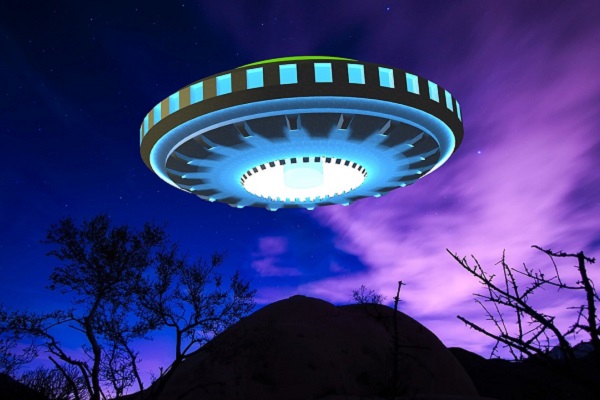
–>
October 6, 2022
On Sunday, October 30, 1938, thousands of radio listeners heard terrifying news: aliens had invaded New Jersey.
‘); googletag.cmd.push(function () { googletag.display(‘div-gpt-ad-1609268089992-0’); }); }
From a New York Daily News article, October 31, 1938:
A radio dramatization of H.G. Wells’ “War of the Worlds” which thousands of people misunderstood as a news broadcast of a current catastrophe in New Jersey created almost unbelievable scenes of terror in New York, New Jersey, the South and as far west as San Francisco between 8 and 9 o’clock last night.
Ridiculous, you say. Why would people believe that aliens had invaded? They believed because it was news. Orson Welles’s adaptation of the War of the Worlds novel used familiar, trusted devices to report the fictional attack — news bulletins, updates from live reporters on the ground. He used actual government positions like New Jersey governor and secretary of interior and physical locations like Trenton, Mercer, and Princeton. These positions and locations were all too familiar to those listening to the “news” updates — confirmation that the reports were real.
‘); googletag.cmd.push(function () { googletag.display(‘div-gpt-ad-1609270365559-0’); }); }
Still, does hearing it on the news make it any less impossible? Apparently, because thousands were convinced right up until they switched channels or heard the retraction. But what would have happened if War of the Worlds had been on every channel, reported by all news outlets? What if there’d never been a retraction? Wouldn’t millions have believed the impossible?
These lessons were not lost on power brokers around the world. In the U.S. today, eight billionaires control our once free press, while their oligarch allies monopolize social media. Their messages are not only uniform across all channels, but often repeated word for word. And because it’s every mainstream media channel, because nearly every social media site backs it up, fake news is the order of the day — fabricated stories, nonexistent sources, blatant propaganda presented as fact.
So how could these information power brokers use this imperium? Could the “news,” say, take a story made from whole cloth, total fiction, and make it real, use it to damage and possibly remove a sitting president? They could, and they did.
For more than two years, media hammered the story that Trump and Vladimir Putin are best buds who conspired to rig the 2016 election. Reporters interviewed experts, former and current government officials, to cloak the story in realism. The DOJ even assigned a special prosecutor to investigate the crime. It was clear: Trump and Putin stole the election from Hillary Clinton.
Except not only were the charges false, but the whole thing was just a fairy tale, a fantastical story brought to life by media. Eventually, the special prosecutor cleared Trump, and it’s since been established that Hillary Clinton’s campaign conjured up the scandal. Yet how many Americans still believe the Russian hoax?
Could media use their superpower to, say, push for a civil war? Could they sound the alarm of an enemy within plotting to riot, to overthrow the government? They could, and they did. They can, and they are.
‘); googletag.cmd.push(function () { googletag.display(‘div-gpt-ad-1609268078422-0’); }); } if (publir_show_ads) { document.write(“
It seems that though millions of citizens have attended peaceful MAGA (Make America Great Again) rallies without incident, they’ve suddenly turned into violent insurrectionists who are out to destroy America. Resident Biden recently labeled MAGA “full of anger, violence, hate, and division.” Across media, the same trigger words are repeated verbatim, the same predictions of a MAGA uprising. Again, there are no facts to support these accusations, but when the lies are supported by intelligence agencies, when they’re spread all across print and electronic media, it’s treated as fact, it’s believable.
Fine, you say — but Trump, MAGA, it’s all politics, and they all play dirty, they all lie. True…but what non-political havoc could media wreak with this superpower?
Could they, say, create public hysteria over a virus with a 99% survival rate for most age groups? Could they support martial law, closed schools and businesses, even churches? Could they make people go into hiding, make them mask up and vax up in a fight for their lives? They could, and they did.
News personalities breathlessly reported the growing crises in, Italy, Iran, and other countries. It’s a pandemic! News channels ran news tickers 24/7 showing huge numbers of people “infected” by a highly transmissible virus. Hysterical citizens raided stores, stockpiled water, groceries, toilet paper. The run on goods caused shortages, which increased the panic, confirmed the news of a coming apocalypse.
But once a judge ruled that airlines couldn’t mandate masks and people saw there was no ensuing black plague, the public temperature started to come down. Then a weaker strain of COVID (omicron) hit, and herd immunity kicked in. Then, though seemingly everyone was getting the virus, bodies weren’t piling up, hospitals stayed open, and the fear began to subside.
Could these powerful information soothsayers actually control minds, convince people reality isn’t real, the physical isn’t physical, and people can’t believe what they see? They could, and they did. They can, and they are.
Mainstream and social media, Hollywood, government all push the delusion that men can be women and women can be men, that gender is a mental state unrelated to one’s physical make-up. Thus, a man can keep his male body and still live as a female. Men can and do dominate women’s sports, as men are physically stronger and faster than women. A man can even be declared “Woman of The Year.”
This is not only delusional; it’s straight-up crazy. And though most people know this, many not only share the delusion, but push their derangement on others, demanding that we all partake in the lunacy.
In spite of this jump-the-shark moment, many still trust the news. They don’t look for other sources, don’t question the reports.
“You are young yet, my friend, but the time will arrive when you will learn to judge for yourself of what is going on in the world, without trusting to the [reports] gossip of others. Believe nothing you hear, and only one half that you see.“
—Edgar Allan Poe, “The System of Doctor Tarr and Professor Fether“
It falls to those who seek truth to help those who can’t “judge” for themselves. We must expose media as the enemy, be armed with facts from reliable sources, expose the lies, and reject the illusions. It falls to us to educate others.
“If a nation expects to be ignorant and free, in a state of civilization, it expects what never was and never will be. The functionaries of every government have propensities to command at will the liberty and property of their constituents. There is no safe deposit for these [liberty and property] but with the people themselves; nor can they be safe with them without information.“
—Thomas Jefferson
But hey, don’t be too quick to judge those who believed that aliens had invaded New Jersey, that President Trump’s a secret Russian agent, that MAGA is actually a terrorist organization, that a virus with a 99% survival rate for most is a killer plague, or that we can’t tell a boy from a girl — can’t even be sure which we are. These believers aren’t ignorant, not uninformed. They get their facts from the same trusted sources we’ve relied on since the country’s founding.
They heard it on the news.

Image via Needpix.
<!– if(page_width_onload <= 479) { document.write("
“); googletag.cmd.push(function() { googletag.display(‘div-gpt-ad-1345489840937-4’); }); } –> If you experience technical problems, please write to [email protected]
FOLLOW US ON
<!–
–>
<!– _qoptions={ qacct:”p-9bKF-NgTuSFM6″ }; ![]() –> <!—-> <!– var addthis_share = { email_template: “new_template” } –>
–> <!—-> <!– var addthis_share = { email_template: “new_template” } –>







